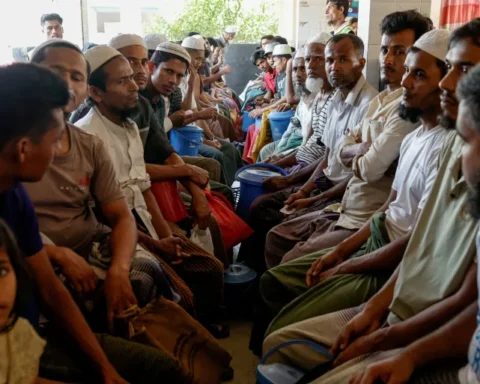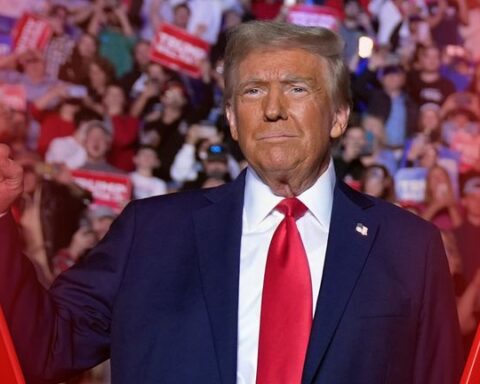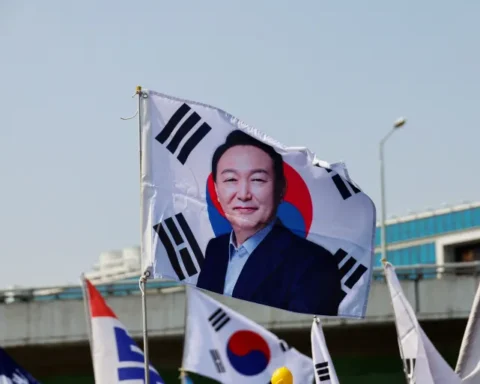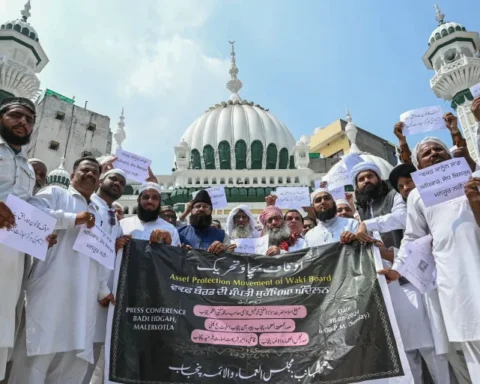The United States and China have achieved what many deemed impossible – a historic meeting between US President Joe Biden, Japan’s Prime Minister Fumio Kishida and South Korea’s President Yoon Suk-yeol.
Mr Biden hosted the first stand-alone meeting among the three countries at the Camp David presidential retreat in the US on Friday. It’s a diplomatic – but still tenuous – coup for the American leader.
South Korea and Japan are neighbours and old US allies, but they have never been friends.
Now, however, an increasingly assertive China has renewed US interest in East Asia. And it has brought together two countries who for decades have struggled to overcome deep historical grievances.
Speaking ahead of the meeting, Mr Biden praised the “political courage” of the South Korean and Japanese leaders.
“Our countries are stronger, and the world will be safer, as we stand together. I know that’s a belief that we all three share,” he said, while Mr Yoon said it was a “historic day”.
In a joint statement, they said they opposed China’s “dangerous and aggressive behaviour” in maritime disputes in the East and South China Seas.
They also agreed to hold regular joint exercises, consult each other during crises, share real-time data on North Korea and hold summits every year.
“I find the meeting at Camp David mind-blowing,” Dennis Wilder wrote on X, formerly Twitter. A professor at Georgetown University, he managed the Japan and South Korea relationship under former President George W Bush.
At that time, they could “barely get South Korean and Japanese leaders to meet with us in the same room,” he said.
In recent months, Mr Kishida and Mr Yoon have taken tentative steps to resolve their hostilities, and strengthen ties with Washington. This once-inconceivable alliance is driven by shared concerns – the biggest of which is China.
The meeting at Camp David – also the first time foreign leaders have visited the presidential retreat since 2015 – is an attempt to “signify and to demonstrate how seriously” Mr Biden takes the relationship between Japan and South Korea, according to a White House spokesman.
Why has it taken this long?
For one, the wounds are old.
Some may describe the two countries as “frenemies”, but it’s too trite a term to describe the deep hurt among South Koreans, including the thousands of so-called “comfort women” who were abducted and used as sex slaves by the Japanese army during World War Two.
South Koreans believe the Japanese never properly apologised for the colonisation of the Korean peninsula from 1910 to 1945. Tokyo, however, argued that it had atoned for its historical sins in several treaties.
Any détente has always been fragile, almost akin to a game of Jenga. Even when the East Asian bloc appeared solid, a single wrong move could bring the whole edifice down.
In 2018, a long-running court case in Seoul over Japan’s use of forced labour during WW2 started a trade dispute which plunged relations between the neighbours to their lowest since the 1960s.
But there has been progress recently, including a milestone meeting in March, offering Washington a new window of opportunity.
But there is a good reason for the two new administrations to put their differences aside, even at the cost of political capital on the domestic front.
This is, after all, the era of pragmatic politics – and they see a bigger threat looming.
China’s assertive posture in Asia has alarmed its neighbours. Beijing claims Taiwan, a democratically governed island, and has not ruled out the use of force to “unify” it with the mainland. Incursions into Taiwanese airspace and major military drills are now the so-called “new normal”.
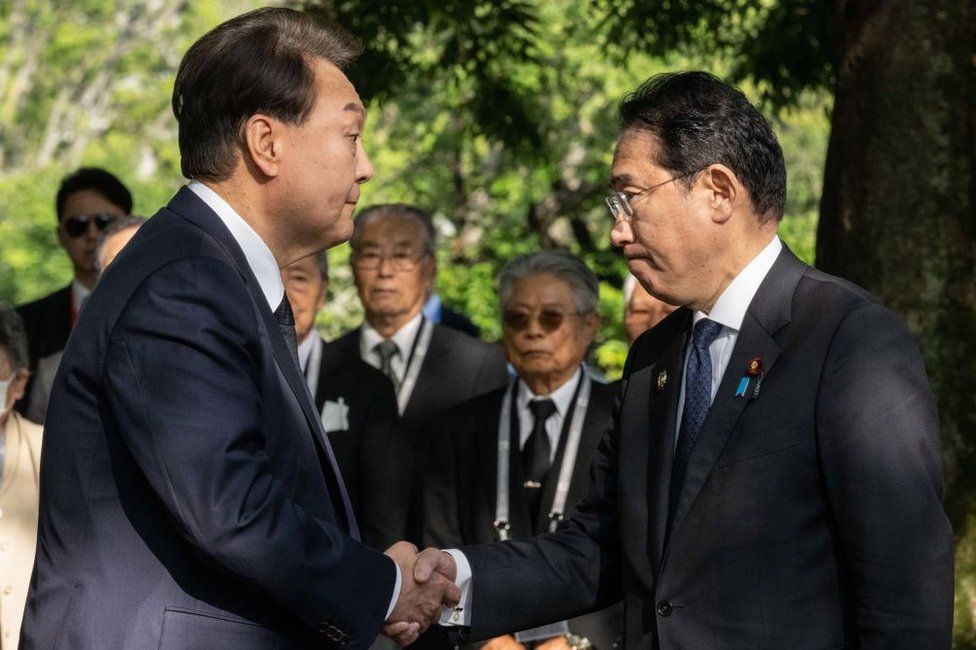
There is also North Korea. which has carried out more than 100 weapons tests since the start of 2022, including firing missiles towards Japan. The war in Ukraine too has prompted many countries, including South Korea and Japan, to prioritise national security.
All of this appears to have helped Mr Biden win where previous administrations in Washington have failed.
“This marks a major milestone in the history of the trilateral relationship that has moved in fits and starts over the last three decades,” said Andrew Yeo, the SK-Korea foundation Chair at the Brookings Institution in Washington.
He says the three sides will aim to “cement the gains” they have made in the last year or so, “while building momentum… to address a range of security challenges in north-east Asia and the Indo-Pacific region”.
That would mean signing agreements on defence, diplomacy and technology. It’s already known that they will agree to hold regular military exercises, set up a new three-way crisis hotline and, crucially, pledge to meet once a year. Washington’s goal then is to establish long-term ties that will last well beyond the sitting presidents.
“Biden, Yoon and Kishida have a chance to make even bigger history that lasts beyond a milestone meeting at Camp David,” said Duyeon Kim.
“Their respective governments will need to implement their joint vision proactively and beyond their leadership terms because the Seoul-Tokyo relationship will continue to ebb and flow. If an ultra-leftist South Korean president and an ultra-right-wing Japanese leader are elected in their next cycles, then any one of them could derail all the meaningful, hard work Biden, Yoon and Kishida are putting in right now.”



